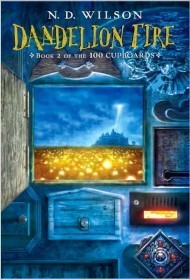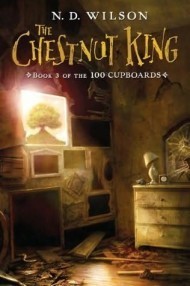Justin Taylor's Blog, page 318
June 22, 2011
Erasing Hell and God Wins
Last week John Starke blogged at The Gospel Coalition about four new books that respond to Rob Bell's Love Wins. (Since that post, I see that two more are coming: Bobby Conway's Hell, Rob Bell, and What Happens When People Die and Larry Dixon's Farewell, Rob Bell.)
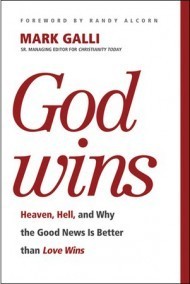 Last week Randy Alcorn, who wrote the foreword for Mark Galli's God Wins, wrote a review of the book on his blog. Today he reviews reviews Erasing Hell by Francis Chan and Preston Sprinkle.
Last week Randy Alcorn, who wrote the foreword for Mark Galli's God Wins, wrote a review of the book on his blog. Today he reviews reviews Erasing Hell by Francis Chan and Preston Sprinkle.
Here is Randy's analysis of how the two books compare:
I would describe Erasing Hell as passionate, biblically reasoned and pastoral. God Wins is historically rooted, theologically reasoned and journalistically precise. Someone who prefers thoughtfully presented theology and history might favor Galli's book, while someone who enjoys careful exposition of key biblical passages and likes to connect with an author on an emotional level might prefer Chan's.
I deeply appreciated both books; their content is sufficiently unique to justify reading both. I think it's a God-thing that these small books are so different, yet complement each other with minimal redundancy. With their different backgrounds, personalities, life experiences, and writing styles, Mark Galli and Francis Chan each bring to the table things the other doesn't. Reading them back to back, I found they produced a stereo effect that made the sound fuller than either on its own.
These are both small books. Combined, they are less than 80,000 words, which would total one medium-sized book, still smaller than most theological books. If you are thinking a book can't be that great if it's just a critique, realize that both of these authors don't just respond to Bell, they set forth a positive case for a central biblical doctrine. . . .
I love that these authors don't throw anyone under the bus for raising questions. But neither do they throw orthodox Christians throughout church history under the bus for believing the most difficult teachings of Jesus.
. . . God Wins and Erasing Hell will be invaluable tools for pastors and lay leaders to guide believers in evaluating these doctrines.
. . . The best part about Chan's Erasing Hell and Galli's God Wins is that as I read both these books, God became greater and I became less.
If you haven't seen it yet, below is a video of Francis talking about his heart behind the book, followed by an interview with Preston Sprinkle, who talks about working with Francis on the project, what the Bible actually say about hell, whether hell as important as we sometimes make it out to be, the best way to approach a study on hell, and what types of people (in the first-century world and in our modern setting) are the Bible's warnings about hell directed toward.
June 21, 2011
If You Are in Christ You Have Been Raised and You Will Rise
Five Lessons from the First Five Years of Pastoral Ministry
Some good lessons here from Tim Raymond.
How to Ask God a Question
And Zechariah said to the angel, "How shall I know this? For I am an old man, and my wife is advanced in years." (Luke 1:18
And Mary said to the angel, "How will this be, since I am a virgin?" (Luke 1:34)
Mark Galli writes in God Wins:
So what's the difference here? The questions are so similar. Why is Mary's treated with respect while Zechariah's is an occasion for spiritual discipline? Why does the angel seem indifferent to Mary's natural curiosity and angry about Zechariah's?
The difference appears in one little additional clause Zechariah adds to his question. Mary simply asks, "How can this happen?" Zechariah asks, "How can I be sure this will happen?"
Mary's question is about God. Zechariah's question is about himself.
Mary's question assumes God will do something good and great, and seeks to know how it will unfold. Zechariah is not at all sure that God is good and great, and seeks proof.
Mary wants to learn more about the goodness of God. Zechariah mostly wants to be self-assured.
As I said, there are questions, and then there are questions.
As these two stories show, questions driven by faith and questions driven by self-justification can sound very similar. Sometimes they can be identical in their wording, but they are not identical in their motives. A question can be grounded in trust in God's goodness—or it can be a demand for a sign. God is pleased with the former, but not so pleased with the latter.
You can read the whole excerpt from the book here.
Notes from the Tilt-A-Whirl Movie
I've mentioned on this blog before that I am a fan of Nate Wilson's engaging and thoughtful book Notes from the Tilt-a-Whirl, a poetically subversive piece of work against idolatry and for the gospel. You can read below an earlier post I wrote on it.
Now there's a film companion, putting a lot of the content on film. It's nicely done, and I hope it will take the message of the book to a new audience. WTS Books is running a 60% off special (so $8.79 instead of $21.99), with the sale ending on Tuesday, June 28.
Here's the description:
An Idea Film. A Bookumentary.
A cinematic treatment of a worldview. A poet live in concert. A motion picture sermon. VH1 Storytellers meets Planet Earth. 60 Minutes meets Sinners in the Hands of an Angry God. In this unusual but fascinating film sequence, best-selling author N.D. Wilson gives an emotional and intellectual tour of life in this world and the final chapter that is death. Everything before and after and in between is a series of miracles—some of which are encouraging, others disturbing and uncomfortable.
Here's the trailer, followed by some excerpts, followed by some endorsements:
"Combining stunning visuals with an entertaining and engaging text, Wilson yanks you out of the numbing sameness of your frenetic pursuit of what quickly passes and leads you to care about and inquire into things that are transcendent. Don't watch it once. Watch it over and over again. It's just that powerful and and important."
—Paul David Tripp, Professor and Executive Director of Pastoral Life and Care, Redeemer Seminary; President, Paul Tripp Ministries
"This is a masterful and compelling use of God's general and special revelation. Nate Wilson artfully brings the two together in this symbiotic blend of verbal and non-verbal word. If apologetics has more to do with persuasion than proof (as I think it does), this film is replete with apologetic depth and richness. The "poetry" of God is brought out in bold relief. Watch, learn and be persuaded of the Truth."
—K. Scott Oliphint, Professor of Apologetics and Systematic Theology, Westminster Theological Seminary
"My friend Nate reminds me of C.S. Lewis and Jerry Seinfeld at the same time. Like Lewis, he has a white knuckle grip on philosophical themes and inquiries while at the same time using them in service to the gospel in a way that resonates with the real questions and concerns of our time. He's also Seinfeldian in the sense that he has a remarkable knack to see usually ignored details. He has a keen eye for seeing God's handiwork and finding gospel truth that many would overlook as every day, mundane things. Combine all this with a good sense of humor, remarkable creativity, humble confidence, and savvy vision and you have a trustworthy and fun guide showing you around. Highly recommended!"
—Tullian Tchividjian, Pastor of Coral Ridge Presbyterian Church in Ft. Lauderdale
"The Notes from the Tilt-a-Whirl Film Companion is a compelling medium for N.D. Wilson's meditations on theology and the world in which we live. In these ten, short, video portraits, Wilson provokes us to consider the God who is there; the God who speaks into existence a lavish universe and all the stories of our lives; the God who, in turn, hides himself in the myriad details of those stories to be discovered by those with eyes to see and ears to hear. Wilson beckons us to stand on the edge of the storm; to confront our unbelief and petty fears so that the goodness and greatness of God might astound us and fill our hearts with gratitude and joy. I highly recommend this resource."
—Scott Anderson, Executive Director, Desiring God
"Every time Nate Wilson opens his mouth my mind is bent a little bit, and this film is no exception. Notes from the Tilt-a-Whirl throws out all assumptions and takes me on an adventure which ends with a bigger awe for God, a more mysterious world, and a thankfulness to be part of God's big story."
—Mike Anderson, The Resurgence, Mars Hill Church, Seattle
Here was my review of the book-version:
N.D. Wilson's Notes from the Tilt-a-Whirl is certainly unlike any book I've read before. I pity the publicist whose job it is to provide a soundbite or snapshot from the book!
How would one describe it?
Wide-eyed, look-ma-no-hands exuberant enjoyment on this spinning tilt-a-whirl we call Earth as it passes through its four seasons?
In-your-face mockery of the atheists and their god called Boom?
Full-throated defense of a good and sovereign God in a world of pain and evil?
A poetic exploration of eucatastrophe?
A gospel tract for postmodern times?
All of the above.
If I had to summarize it in a word, I'd choose provocative—in the old-fashioned sense of provoking, prodding, stimulating, inciting. To do what? To see and to sense and to smell the glory all around us.
Wilson is one of those literalists—he takes Solomon and Jesus seriously when they say to "observe the ant" and to "consider the lilies of the field." Wilson doesn't stare at them for a few minutes or look them up on Wikipedia–he gathers the kids and gets dirt on his chin and engages in delightful, obedient study.
And then he does the same with topics like heaven and hell, gospel and grief, wonder and disbelief.
The result—for those of us willing to following the biblical paradox of being childlike without being childish—is that we feel like fish being pulled out of the water for a few moments, finally able to see with new eyes what we have long taken for granted.
Calvin wrote about how God's powers are portrayed for us as in a painting, that we stand within and enjoy the theater of God's glory, and that the created world is a mirror of God's divinity. If you want a faithful and creative exploration of what this means, Notes from the Til-a-Whirl will help you greatly enjoy the ride!
Publisher's Weekly recently gave it a nice review:
Hold your breath and throw your hands in the air! This theological ride thrills with a colorful whir of profound and profoundly amusing meditations on creation, existence and God. Influenced by his evangelical Christian faith, Wilson (Leepike Ridge) uses an engaging, casual style in this personal notebook of spiritual thought as he offers readers a peek into his world of unapologetic wonder. Spinning through the pages, reflections on philosophers, theologians, leeches and kittens offer dazzling new perspective on the bright lights and dark corners of our carnival-like existence. Wilson's most striking achievement in all his whirling musings is an ever-present insistence on optimism. Even when contemplating death, he cheerfully concludes that he will then have admission to "go on the gnarly rides" of immortality. Indeed, Wilson excels in his elegantly intricate arguments for hope: even a naked mole rat matters. Yes, the prose often jolts and reels on its paper track. It can be an unsettling ride. But that is the poetry of a tilt-a-whirl—the poetry of living.
And this is Doug Wilson's explanation for the book:
The conceit for the book is that the solar system is a ride at a carnival, with circular motions inside circular motion. Not only do we have the carnival-like motions, we have a carnival-like environment, gaudy colors and situations included. The book works through the four quadrants of one trip around the circumference, through the seasons of winter, spring, summer, autumn. Those who don't get either thrilled or sick (or both) in the ride are those who, in the name of realism, resolutely ignore everything that is going on all around them, and they ignore it all day long.
As they are on display in this book, Nate's gifts revolve around a very basic truth. He has the same ability that Chesterton had, that of making ordinary things seem extraordinary, and then with a start you realize that it is not a verbal trick — ordinary things are extraordinary. Why don't we see that more often? I mean look at a walnut, for Pete's sake.
A metaphor is a twisted and circuitous route that goes straight to the truth. Some metaphors are so convoluted that they get there right away. This book is just crammed with them.
June 20, 2011
Summer Reading for Kids
At our household we are nearing the completion of reading The Hobbit (just two chapters left!). Last year we read some of C. S. Lewis's The Chronicles of Narnia. Lewis described reading George MacDonald's fantasies as a baptism of his imagination, and I hope the same proves true for our kids.
N.D. Wilson and Andrew Peterson are two young, contemporary writers deeply influenced by Tolkien and Lewis. If you're looking for books to read aloud, or to have your kids read—or simply to "awaken your inner eight-year-old" (as Jeffrey Overstreet says)—then their works might be worth looking into.
Some descriptions below:
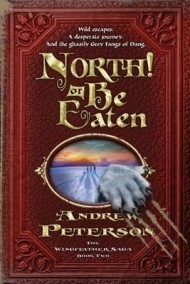 North! Or Be Eaten
North! Or Be EatenJanner, Tink, and Leeli Igiby thought they were normal children with normal lives and a normal past. But now they know they're really the Lost Jewels of Anniera, heirs to a legendary kingdom across the sea, and suddenly everyone wants to kill them.
In order to survive, the Igibys must flee to the safety of the Ice Prairies, where the lizardlike Fangs of Dang cannot follow. First, however, they have to escape the monsters of Glipwood Forest [All possessing very sharp teeth], the thieving Stranders of the East Bend [Murderous scoundrels, the lot], and the dreaded Fork Factory [Woe!].
But even more dangerous are the jealousies and bitterness that threaten to tear them apart, and Janner and his siblings must learn the hard way that the love of a family is more important than anything else.
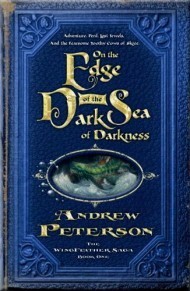
On the Edge of the Sea or Darkness
Once, in a cottage above the cliffs on the Dark Sea of Darkness, there lived three children and their trusty dog Nugget. Janner Igiby, his brother Tink, their crippled sister Leeli are gifted children as all children are, loved well by a noble mother and ex-pirate grandfather. But they will need all their gifts and all that love to survive the evil pursuit of the venomous Fangs of Dang who have crossed the dark sea to rule the land with malice and pursue the Igibys who hold the secret to the lost legend and jewels of good King Wingfeather of the Shining Isle of Anniera.
Andrew Peterson spins a quirky and riveting tale of the Igibys' extraordinary journey from Glipwood's Dragon Day Festival and a secret hidden in the Books and Crannies Bookstore, past the terrifying Black Carriage, clutches of the horned hounds and loathsome toothy cows surrounding AnkleJelly Manor, through the Glipwood Forest and mysterious treehouse of Peet the Sock Man (known for a little softshoe and wearing tattered socks on his hands and arms), to the very edge of the Ice Prairies.
Full of characters rich in heart, smarts, and courage, On the Edge of the Dark Sea of Darkness presents a world of wonder and a tale children of all ages will cherish, families can read aloud, and readers' groups are sure to discuss for its layers of meaning about life's true treasure and tangle of the beautiful and horrible, temporal and eternal, and good and bad.
Download the first chapter here.
 The Monster in the Hollows
The Monster in the Hollows Janner Wingfeather's father was the High King of Anniera. But his father is gone. The kingdom has fallen. The royal family is on the run, and the Fang armies of Gnag the Nameless are close behind.
Janner and his family hope to find refuge in the last safe place in the world: the Green Hollows—a land of warriors feared even by Fangs of Dang. But there's a big problem. Janner's little brother—heir to the throne of Anniera—has grown a tail. And gray fur. Not to mention two pointed ears and long, dangerous fangs. To the suspicious folk of the Green Hollows he looks like a monster.
But Janner knows better. His brother isn't as scary as he looks. He's perfectly harmless.
Or is he?
Join the Wingfeathers on an adventure filled with mystery, betrayal, and sneakery in a land of tasty fruits. There's a monster on the loose and the truth lurks in the shadows
Twelve-year-old Henry York is going to sleep one night when he hears a bump on the attic wall above his head. It's an unfamiliar house—Henry is staying with his aunt, uncle, and three cousins—so he tries to ignore it.
But the next night he wakes up with bits of plaster in his hair. Two knobs have broken through the wall, and one of them is slowly turning. . . .
Henry scrapes the plaster off the wall and discovers doorsâ€"ninety-nine cupboards of all different sizes and shapes. Through one he can hear the sound of falling rain. Through another he sees a glowing room—with a man strolling back and forth! Henry and his cousin Henrietta soon understand that these are not just cupboards. They are, in fact, portals to other worlds.
100 Cupboards is the first book of a new fantasy adventure, written in the best world-hopping tradition and reinvented in N.D. Wilson's own inimitable style.
Henry York never dreamed his time in Kansas would open a door to adventure—much less a hundred doors. But a visit to his aunt and uncle's farm took an amazing turn when cupboard doors, hidden behind Henry's bedroom wall, revealed themselves to be portals to other worlds. Now, with his time at the farm drawing to a close, Henry makes a bold decision: he must go through the cupboards to find the truth about where he's from and who his parents are. Following that trail will take him from one world to another, and ultimately into direct conflict with the evil of Endor.
Dandelion Fire is the second book of N.D. Wilson's 100 Cupboards, a new fantasy adventure that follows the magical exploits of Henry York and his cousins.
When Henry York found 99 cupboards hidden behind his bedroom wall, he never dreamed they were doors to entirely new worlds! Unfortunately, Henry's discovery freed an ancient, undying witch, whose hunger for power would destroy every world connected to the cupboards—and every person whom Henry loves. Henry must seek out the legendary Chestnut King for help. Everything has a price, however, and the Chestnut King's desire may be as dangerous as the witch herself.
N. D. Wilson concludes a remarkable, worlds-spanning journey that began with one boy and one hundred avenues to adventure.
The Chestnut King is the third book of N.D. Wilson's 100 Cupboards, a new fantasy adventure that follows the magical exploits of Henry York and his cousins.
World Magazine's Book(s) of the Year
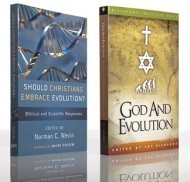 World Magazine's 2011 "Book of the Year" went to two books, both edited collections of essays and both on God and evolution:
World Magazine's 2011 "Book of the Year" went to two books, both edited collections of essays and both on God and evolution:
Should Christians Embrace Evolution: Biblical & Scientific Responses , ed. Norman Nevin
God and Evolution, ed. Jay Richards
You can read Marvin Olasky's cover story about the books here.
Packer on Regeneration and Sanctification
J. I. Packer's Concise Theology: A Guide to Historic Christian Beliefs is valuable not only for its theological content but also for its exemplification of Calvin's desire for "clarity and brevity." As Dr. Packer has said on more than one occasion: "Packer by name; packer by nature." Each word is carefully chosen, and Packer often says it better in two pages than many theologians do in twenty.
Here's an example, from his 3-page chapter on sanctification, where he explains the difference between regeneration and sanctification:
The concept [of sanctification] is not of sin being totally eradicated (that is to claim too much) or merely counteracted (that is to say too little), but of a divinely wrought character change freeing us from sinful habits and forming in us Christlike affections, dispositions, and virtues.
Sanctification is an ongoing transformation within a maintained consecration, and it engenders real righteousness within the frame of relational holiness.
Relational sanctification, the state of being permanently set apart for God, flows from the cross, where God through Christ purchased and claimed us for himself (Acts 20:28; 26:18; Heb. 10:10).
Moral renovation, whereby we are increasingly changed from what we once were, flows from the agency of the indwelling Holy Spirit (Rom. 8:13; 12:1-2; 1 Cor. 6:11, 19-20; 2 Cor. 3:18; Eph. 4:22-24; 1 Thess. 5:23; 2 Thess. 2:13; Heb. 13:20-21). God calls his children to sanctity and graciously gives what he commands (1 Thess. 4:4; 5:23).
Regeneration is birth; sanctification is growth.
In regeneration, God implants desires that were not there before: desire for God, for holiness, and for the hallowing and glorifying of God's name in this world; desire to pray, worship, love, serve, honor, and please God; desire to show love and bring benefit to others.
In sanctification, the Holy Spirit "works in you to will and to act" according to God's purpose; what he does is prompt you to "work out your salvation" (i.e., express it in action) by fulfilling these new desires (Phil. 2:12-13). Christians become increasingly Christlike as the moral profile of Jesus (the "fruit of the Spirit") is progressively formed in them (2 Cor. 3:18; Gal. 4:19; 5:22-25). . . .
Regeneration was a momentary monergistic act of quickening the spiritually dead. As such, it was God's work alone.
Sanctification, however, is in one sense synergistic—it is an ongoing cooperative process in which regenerate persons, alive to God and freed from sin's dominion (Rom. 6:11, 14-18), are required to exert themselves in sustained obedience.
God's method of sanctification is neither activism (self-reliant activity) nor apathy (God-reliant passivity), but God-dependent effort (2 Cor. 7:1; Phil. 3:10-14; Heb. 12:14).
Knowing that without Christ's enabling we can do nothing, morally speaking, as we should, and that he is ready to strengthen us for all that we have to do (Phil. 4:13), we "stay put" (remain, abide) in Christ, asking for his help constantly—and we receive it (Col. 1:11; 1 Tim. 1:12; 2 Tim. 1:7; 2:1).
Homosexuality and the Gospel
One of the best talks I've heard on homosexuality, the church, and the gospel was delivered by Albert Mohler at the 2004 Desiring God National Conference. You can listen to it here. A chapter-length version was then published in Sex and the Supremacy of Christ, which you can read online for free.
It might be helpful to reprint a few excerpts.
On living in light of a limp:
An analogy might be useful at this point. Consider a man who has sinned by driving under the influence of alcohol. One night, sinfully drunk and recklessly irresponsible, this man gets into his car and drives it right into a wall at high speed. His body is broken, but his life is saved as he is taken to the hospital and receives emergency treatment. He recovers from the accident, but he will forever walk with a limp. Throughout his life, he will drag an injured leg, which can heal to a point, but will never be fully restored.
Let us follow this man as he comes to faith in the Lord Jesus Christ. He becomes a wonderful trophy of God's grace, as the grace of God transforms him, reordering his affections right down to the fact that he gains victory over alcoholism. Regeneration has produced a new man, even as sanctification is demonstrated in his growth in grace. Old things have passed away and behold all things have become new (2 Cor. 5:17)—but he still walks with a limp.
The work of the Holy Spirit in his life is evident, even as his limp continues as a part of his experience. He will limp all the way to the grave. He has become what only God could make him as a demonstration of God's glory in the salvation of a sinner. But until the day of his glorification, this man will limp.
That limp does not become a disqualification for this man's ability to display the glory of God. As a matter of fact, he may begin to see his limp as a way of explaining to people, "I want to tell you who I was in order to tell you who I now am by the grace of God. You see, this limp is a part of my story. I do not exult in this limp, but this limp is an important part of telling my story about how I came to know the Lord Jesus Christ and how he changed my life."
In reality, every one of us limps. Throughout our lives until the day of our glorification, every one of us will limp. We must look to the moment of our glorification as the moment of our release from every limp. On that day, every tear will be wiped away, every injury will be fully restored, everything will be made right, and everything will be made whole. Everything and every redeemed person will then perfectly display the glory of God. We are the people with the theology adequate to explain this, and thus, we can offer the only genuine means of personal transformation.
On change:
We know better than to say that people cannot change. We also know better than to believe that people can change themselves. As Jonathan Edwards made clear, we sin in our affections, and we do not even understand ourselves in terms of why we love the things we love and desire the things we desire. This is why we are so dependent upon the work of Christ in our lives and the continuing work of the Holy Spirit in reordering our affections. This is no easy process, but it is real and it is enduring.
Is our purpose to make homosexuals into heterosexuals? The answer to that question must be both yes and no. We must urgently urge all sinners to repent and abandon their sin, but convincing homosexuals to think of themselves as heterosexuals is not tantamount to salvation. We must be honest about the sinfulness of homosexuality in order that we can show homosexuals their need for salvation and the transforming power of Jesus Christ in their lives. We can promise that this power of transformation will, by the grace of God, lead to a reordering of their lives and require a turning away from the sins of their past. As Christians, coming for whatever our individual background in sin may be—we come under mutual accountability to the Word of God and his command in all things—including our sexuality.
To those struggling with homosexuality:
I want to speak honestly to those who are struggling with homosexual affection. You must know that this is sin, and you must recognize that your affections are corrupted by sin. Even in your own heart, you can probably never even separate your desires and impulses in terms of inner motivation and affection. Like all of us, you are a sinner in the midst of a sinful world, but don't let anyone tell you that you can't change. Becoming heterosexual is not salvation, but the miracle of regeneration and sanctification will produce, by God's grace, the right affections in your heart and desire. Knowing what God has declared to be objectively right and objectively wrong, we must direct ourselves—whether our sinful sexual profile be heterosexual or homosexual—toward the objective glory of God as revealed in his Word. We must claim the promises of God and seek God's glory in every dimension of our being.
Do we want homosexuals to find heterosexuality?
Yes, as much as we want liars to become tellers of the truth and adulterers to be faithful; as much as we want the disobedient to become obedient to parents and the proud to be humble. God's glory is in seeing that God's command is accompanied by God's provision so that we, by his grace, can be transformed so that we will even desire what he wills for us to desire.
This is what the church is all about. We are the people who gather together to exalt in the grace of God and to proclaim the cross of the Lord Jesus Christ as the answer to human sinfulness. We come together to hold each other accountable to the Word of God and to rejoice in what God is doing in us until the very day that we die. We come together in the assurance of the resurrection that is to come and the glorification that will be God's gift. Like the apostle Paul, we are convinced that "he who began a good work in [us] will bring it to completion at the day of Christ Jesus" (Phil. 1:6).
To the church:
We must be the people who love homosexuals more than homosexuals love homosexuality. This is a tough challenge. We have to be the people who, because we are possessed by a passion to see God's glory in his creation, love homosexuals more than they love their sin. This means that our love has to be a tenacious love. This will also require that we come to know and establish relationships with those struggling with homosexuality. Armed with an awareness of both the problem and God's provision, we have no right to consider that homosexuals are beyond the grace of God or that any individual is beyond the hope of redemption and transformation. Compassionate truth-telling is deeply rooted in Christian love, and this means that we must love homosexuals more than homosexuals love homosexuality.
Every sinner loves his sin, but the church must love sinners more than sinners love their sinfulness. This is precisely how Christ has loved us, and we must love other sinners even as Christ has loved us.
We cannot allow a homosexual to reduce his identity to being a homosexual. This is a tough message, but we live in an age of identity politics when people say, "What I do in my sex life is who I am—period!" We are the people who know that this is nonsense. Sex is a part of who we are—a vitally important and powerful part—but it is only a part of the total human being. Our sexual desires and sexual practices are genuine pointers to our inner reality and our relationship to God, but sexuality is not the end of the story.
Christians must be the people who refuse to put the period at the end of the sexual sentence. We cannot allow homosexuals to be isolated as a class of persons who are beyond the grace of God and exist in some special category of human sinfulness. We must be the people who say to homosexuals, "I am going to love you even more than you love your sin, because in this same way I was loved until I came to know the Lord Jesus Christ. Someone loved me more than I loved my sin, and this is how I came to know the Lord Jesus Christ as Savior."
Our doctrine of salvation must be accompanied by a strong doctrine of the church. The ecclesia—the purchased people of God—are a covenanted community gathered in mutual accountability to the Word of God. In the bonds of Christ, we are to love each other even more than we love ourselves. Even in the process of church discipline, our purpose is not only to protect the integrity of the people of God, but to love persons into obedience and conformity with the Word of God. The common life of the church is really all about this mutual accountability, mutual encouragement, and exhorting each other to faithfulness unto the authority of the Word of God. The church sins when we deal with these issues wrongly, unscripturally, and superficially.
On fatigue about this issue:
It is easy to detect a sense of fatigue setting in among Christians in America who are tired of arguing, debating, and speaking the truth about homosexuality in the midst of a fallen and rebellious culture. This fatigue is evidence of sin, even as it is an understandable response to the difficulty of our task. We are now coming to a point of cultural crisis, and the church is called to faithfulness as we must declare God's truth with a boldness never summoned before. The church must demonstrate even more candor, more courage, and more truth-telling. We must demonstrate more genuine compassion, even as we reach out to a civilization that is literally falling from within. Even as civilization falls, the church of the Lord Jesus Christ must stand as the People of God, determined to keep its wits even as it shows the love of God and seeks the glory of Jesus Christ, in season and out of season.
Charles Spurgeon on Heaven and on Suffering
Randy Alcorn has combed through Charles Spurgeon's sermons on heaven and compiled the best excerpts and insights into a new devotional book: We Shall See God: Charles Spurgeon's Classic Devotional Thoughts on Heaven.
Those interested in this might also want to check out Beside Still Waters: Words of Comfort for the Soul, which does the same for Spurgeon on suffering. The Lord has used this book to minster deep and sweet comfort to more than one friend.
Justin Taylor's Blog
- Justin Taylor's profile
- 44 followers



